America’s breadbasket moves to Canada .. and other signs of near-holiday madness
Dec 8th, 2006 | By Counterweights Editors | Category: Key Current Issues As virtually everyone prophesied beforehand, on Thursday, December 7, 2006 the Canadian House of Commons defeated a motion to re-open last year’s legalization of gay marriage, 175123. Meanwhile, a December 5 item in the New York Times, headlined “America’s breadbasket moves to Canada?“, seems to have provoked remarkably little attention elsewhere. (Probably because it does not really make a lot of sense?) The Mounties have been shaken by the resignation of Commissioner Guiliano Zaccardelli. Foreign currency traders have been spooked by the Quebecois nation. A private members bill on banning replacement workers has cast light on the perils (or otherwise) of minority governments. And Vancouver has been declared “the Counterfeit Capital of Canada.” Someone strange must be coming to town soon.
As virtually everyone prophesied beforehand, on Thursday, December 7, 2006 the Canadian House of Commons defeated a motion to re-open last year’s legalization of gay marriage, 175123. Meanwhile, a December 5 item in the New York Times, headlined “America’s breadbasket moves to Canada?“, seems to have provoked remarkably little attention elsewhere. (Probably because it does not really make a lot of sense?) The Mounties have been shaken by the resignation of Commissioner Guiliano Zaccardelli. Foreign currency traders have been spooked by the Quebecois nation. A private members bill on banning replacement workers has cast light on the perils (or otherwise) of minority governments. And Vancouver has been declared “the Counterfeit Capital of Canada.” Someone strange must be coming to town soon.
“America’s breadbasket moves to Canada?”
Tom Zeller Jr.’s “The LEDE … Notes on the News” item in the New York Times for December 5, 2006 reported that “a map based on research by Cimmyt, a nonprofit network of global organizations working on food security and agricultural issues, shows the belly of North America’s wheat bounty shifting to Canada by 2050.”
The point was raised in connection with the “annual general meeting in Washington yesterday” of “the Consultative Group on International Agricultural Research, the world’s leading network of agricultural research centers.” The Group “said the steady march of global warming was driving the need to develop new crop strains that can withstand rising temperatures, drier climates and increased soil salt content, as well as boosting agriculture’s role in removing greenhouse gasses from the atmosphere.'”
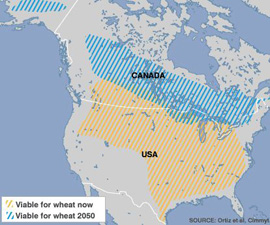 The quite provocative map in question is reproduced here. At last count, the online version of the Zeller piece has inspired 138 comments from readers – many of which echo the theme of the first one: “What the map DOESN”T show is that the new wheat belt (a.k.a. the Canadian Shield) is a glaciated wilderness from which virtually all of the top soil was scraped in the last ice age. Ditto most of Siberia. If that’s where our daily bread is supposed to come from in the year 2050, we’d better lean to eat lichen and moss.”
The quite provocative map in question is reproduced here. At last count, the online version of the Zeller piece has inspired 138 comments from readers – many of which echo the theme of the first one: “What the map DOESN”T show is that the new wheat belt (a.k.a. the Canadian Shield) is a glaciated wilderness from which virtually all of the top soil was scraped in the last ice age. Ditto most of Siberia. If that’s where our daily bread is supposed to come from in the year 2050, we’d better lean to eat lichen and moss.”
Comment 56, however, notes that : “There are also Clay Belts on the Canadian Shield in Northern Ontario. In an earlier era the Ontario provincial government tried to promote agricultural development on them. But a very short growing season held the whole thing back. Maybe climate change will do the trick at last? It may be too that if you drained the Hudson Bay Lowlands you could have a nice big vegetable garden?”
It will surprise no one that comments 10 and 11 introduced a theme which was echoed later as well: “Forget Iraq; invade Canada now! [Posted by Kerwin Myler]” ; and “We must invade Canada NOW! [Posted by Darren The Great].” And then, to show that some Canadians also read the New York Times, there were a few more comments like No. 18: “Believe it … and we’re gonna dip the crops in Mad-cows before mailing them down to all y’all. [Posted by daver]”
Anyway, from a strictly Canadian standpoint maybe someone should tell the new federal Liberal leader and environmental crusader Stephane Dion about this. It may not be all that good for Canada if we stamp out greenhouse gas emissions altogether. (Though of course, of course, we do want to get rid of quite a few … just in case it all really does make sense.)
Four more signs of the times in Canada …
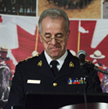 THE MOUNTIES ALWAYS GET THEIR MAN. According to John Ibbitson in the Toronto Globe and Mail : “RCMP Commissioner Giuliano Zaccardelli’s resignation came three months too late. When Mr. Justice Dennis O’Connor’s report demonstrated that RCMP incompetence was largely to blame for the deportation and torture of Maher Arar, many felt that Mr. Zaccardelli should accept responsibility by resigning.” Now he has. And : “This is the first time the commissioner of the RCMP has been forced to resign over his conduct, the denouement (let us hope) of a drama of [recent] dismissals and resignations by senior public officials” in Canada.
THE MOUNTIES ALWAYS GET THEIR MAN. According to John Ibbitson in the Toronto Globe and Mail : “RCMP Commissioner Giuliano Zaccardelli’s resignation came three months too late. When Mr. Justice Dennis O’Connor’s report demonstrated that RCMP incompetence was largely to blame for the deportation and torture of Maher Arar, many felt that Mr. Zaccardelli should accept responsibility by resigning.” Now he has. And : “This is the first time the commissioner of the RCMP has been forced to resign over his conduct, the denouement (let us hope) of a drama of [recent] dismissals and resignations by senior public officials” in Canada.
FOREIGN CURRENCY TRADERS SPOOKED BY QUEBECOIS NATION. Prime Minister Stephen Harper’s “ambiguous motion to recognize the Qubcois as a nation” has apparently “left some foreign traders scratching their heads” and bid the value of the Canadian dollar down somewhat, maybe, or something like that. If true there are those in the Ontario manufacturing sector who might think, yet again, just how useful it is to have Quebec in the Canadian confederation (which it did help start in the first place, after all). This part of the Canadian economy at least works a bit better with a lower dollar these days – as some noted Harvard economist explained a good many years ago now, at some conference in Toronto.
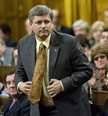 PARLIAMENT IS TALKING ABOUT BANNING REPLACEMENT WORKERS, REGARDLESS OF WHAT THE MINORITY GOVERNMENT WANTS. On December 6, 2006 Paul Vieira of CanWest News Service reported from Ottawa that : “Efforts by Canadian business leaders to defeat a bill banning the use of replacement workers during strikes erupted into a shouting match Tuesday, with MPs accusing business representatives of fear mongering’ and taking part in a union smear.'” How come, you might wonder, all this is happening when the very business-friendly government of Stephen Harper’s Conservative Party of Canada is officially in office? The immediate answer of course is that Mr. Harper has only a minority government, and the bill in question is a mere private member’s bill, from the opposition side. As Mr. Vieira aptly notes : “Very few private member’s bills come into law.” But this one nonetheless “passed second reading in the House of Commons in late October by a margin of 167 to 101.” It still has a way to go. But the implication seems to be that it just might make it in the end. Parliamentary democracy in Canada, apparently, is not quite dead yet.
PARLIAMENT IS TALKING ABOUT BANNING REPLACEMENT WORKERS, REGARDLESS OF WHAT THE MINORITY GOVERNMENT WANTS. On December 6, 2006 Paul Vieira of CanWest News Service reported from Ottawa that : “Efforts by Canadian business leaders to defeat a bill banning the use of replacement workers during strikes erupted into a shouting match Tuesday, with MPs accusing business representatives of fear mongering’ and taking part in a union smear.'” How come, you might wonder, all this is happening when the very business-friendly government of Stephen Harper’s Conservative Party of Canada is officially in office? The immediate answer of course is that Mr. Harper has only a minority government, and the bill in question is a mere private member’s bill, from the opposition side. As Mr. Vieira aptly notes : “Very few private member’s bills come into law.” But this one nonetheless “passed second reading in the House of Commons in late October by a margin of 167 to 101.” It still has a way to go. But the implication seems to be that it just might make it in the end. Parliamentary democracy in Canada, apparently, is not quite dead yet.
 VANCOUVER IS COUNTERFEIT CAPITAL OF CANADA. According to Canadian Anti-Counterfeiting Network founding member Lorne Lipkus, Vancouver “has emerged as a clear Canadian trendsetter in the sale of counterfeit merchandise … When a major new counterfeit trend occurs, chances are I’ll find it in Vancouver,’ he said in an interview … The first time I ever saw Nike apparel like that was in Vancouver and it didn’t hit the rest of Canada for at least a year.'” Vancouver denizens will not be surprised to hear that Lipkus is “a Toronto lawyer who works with clients to fight counterfeit merchandise sales.” Lipkus himself “said he’s not surprised a Microsoft Canada survey found that just 53 per cent of BC residents would rather spend more money to ensure they buy authentic goods this holiday season. That’s 20 percentage points below the national average.” No doubt it is all just yet another part of what Stephen Harper has called the “unique history and eclectic identity of this country.”
VANCOUVER IS COUNTERFEIT CAPITAL OF CANADA. According to Canadian Anti-Counterfeiting Network founding member Lorne Lipkus, Vancouver “has emerged as a clear Canadian trendsetter in the sale of counterfeit merchandise … When a major new counterfeit trend occurs, chances are I’ll find it in Vancouver,’ he said in an interview … The first time I ever saw Nike apparel like that was in Vancouver and it didn’t hit the rest of Canada for at least a year.'” Vancouver denizens will not be surprised to hear that Lipkus is “a Toronto lawyer who works with clients to fight counterfeit merchandise sales.” Lipkus himself “said he’s not surprised a Microsoft Canada survey found that just 53 per cent of BC residents would rather spend more money to ensure they buy authentic goods this holiday season. That’s 20 percentage points below the national average.” No doubt it is all just yet another part of what Stephen Harper has called the “unique history and eclectic identity of this country.”
December 5 Report: GAY MARRIAGE REVISITED .. Steady Eddie in Alberta .. Dion in House .. what’s up in Cuba and Mexico?
 UPDATED DEC 6, 12:00 NOON ET. The plot seems to be that minority Conservative Prime Minister Stephen Harper hopes to quietly slip yet another parliamentary vote on last year’s same-sex marriage legislation by the electorate, in the midst of all the holiday shopping. But there is no good reason to believe that the essential result of this vote, now expected on Wednesday, December 6 (or make that Thursday, December 7 for the actual vote), will be any different from last time around. Legal gay marriage in Canada is not about to disappear.
UPDATED DEC 6, 12:00 NOON ET. The plot seems to be that minority Conservative Prime Minister Stephen Harper hopes to quietly slip yet another parliamentary vote on last year’s same-sex marriage legislation by the electorate, in the midst of all the holiday shopping. But there is no good reason to believe that the essential result of this vote, now expected on Wednesday, December 6 (or make that Thursday, December 7 for the actual vote), will be any different from last time around. Legal gay marriage in Canada is not about to disappear.
Meanwhile, Alberta has a new Conservative provincial premier, whose ascent looks a little like Stephane Dion’s victory in the federal Liberal leadership race. M. Dion himself has taken his first steps as new Liberal leader. And, off in the distance, way, way down south, unsettling fresh developments in Havana and Mexico City suggest how, in so many different parts of the world, the year that lies ahead could be even more interesting than the one that is about to end.
How many times do the Conservatives want to vote on gay marriage?
You could say that Stephen Harper is being or at least trying to be both honourable and clever in his scheme to hold yet another parliamentary vote on same-sex marriage with only18 shopping days left till Christmas 2006. He’s trying to honour a commitment to an important part of his own political base, in an essentially harmless way that most of the rest of us will soon forget.
 Tom Brodbeck has summed it all up nicely in the Winnipeg Sun: “The bad news is the Harper government is revisiting the same-sex marriage issue this coming week … The good news – if all goes as planned – is that it will be a quick and relatively painless process that will satisfy a Conservative election pledge while maintaining the status quo on the legal definition of marriage.
Tom Brodbeck has summed it all up nicely in the Winnipeg Sun: “The bad news is the Harper government is revisiting the same-sex marriage issue this coming week … The good news – if all goes as planned – is that it will be a quick and relatively painless process that will satisfy a Conservative election pledge while maintaining the status quo on the legal definition of marriage.
” … Prime Minister Stephen Harper pledged during the last election campaign to hold a free vote in Parliament asking MPs if they want to revisit the same-sex marriage debate. The plan is to hold that vote this week … It’s not a vote on whether to reverse the same-sex marriage legislation passed by Parliament last year … Rather, it’s a motion on whether MPs have the appetite to revisit the issue at all … By most accounts, it appears a majority of MPs do not want to revisit this thorny issue and are satisfied to let sleeping dogs lie …
“Hopefully this thing won’t last more than a day. MPs who want to get up and give their little speeches on the matter can do so, they can vote before dinner and be done with this thing once and for all … The Conservatives only have a minority government to work with, and there’s little in the way of support from opposition parties to re-open this can of worms … overall, it looks like this thing is dead in the water, with little chance of being revived … Thank goodness. The last thing this country needs is another round of pointless babble on a topic we’ve beaten to death.”
DEC 6 UPDATE: It is now being reported that the actual vote on re-opening the issue will not be held until Thursday, December 7.
The Steady Eddie story …
 Like Stefan Dion in the federal Liberal race, Ed Stelmach started well behind first place in the almost finally coterminous Alberta Conservative race. (And Alberta premier race in effect – the office into which Mr. Stelmach will also be officially sworn on December 15.)
Like Stefan Dion in the federal Liberal race, Ed Stelmach started well behind first place in the almost finally coterminous Alberta Conservative race. (And Alberta premier race in effect – the office into which Mr. Stelmach will also be officially sworn on December 15.)
Alberta is changing very rapidly by all accounts, as many new people cram into the place in search of jobs, jobs, jobs, in the strategic regional energy economy. Who is Ed Stelmach? Here’s some brief reporting from Sarah O’Donnell, at CanWest News Service:
“Quiet, determined toil has defined the farmer and family man’s life. It is how Ed Stelmach achieved Saturday’s upset win in the Progressive Conservative leadership race, defying pundits who dismissed him as too low-profile or charisma-challenged to replace Ralph Klein …Iris Evans, Alberta health minister and dedicated Stelmach supporter, offered this description: He’s been a businessman, a farmer, a manager and he’s had to deal with crisis. What’s so neat to know is he’s so calm all the time.’
“Longtime friend and campaign worker Rod Krips characterizes Stelmach like this: He’s a man of his word. If he says he’ll do something, he does it. If he doesn’t have an answer, he writes it on three by five cards and you can expect to hear from in a day or two’ … Today, the former cabinet minister from Andrew, Alta., is adapting to the reality that he is the province’s 13th premier, the first of Ukrainian descent. The 55-year-old shocked the establishment by winning over former treasurer Jim Dinning and social conservative Ted Morton. The upset was predicted by few.”
Dion in da House …
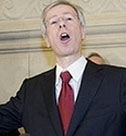 Parts of the Ed Stelmach story do sound a little like Stephane Dion in Montreal, no doubt. But on Monday, December 4 M. Dion was back in Ottawa, taking up his new role as leader of the Official Opposition in the Canadian House of Commons. How did he do?
Parts of the Ed Stelmach story do sound a little like Stephane Dion in Montreal, no doubt. But on Monday, December 4 M. Dion was back in Ottawa, taking up his new role as leader of the Official Opposition in the Canadian House of Commons. How did he do?
From what we saw, not too badly. His former leadership rivals showed up with him at a Liberal caucus meeting. He is still talking about the new “dream-team” leadership of all the candidates, and not just Stephane Dion all by himself. Up against former populist Conservatives who are now all too dominated by a new friendly dictator Prime Minister Stephen Harper, this could be a bit of an interesting play – if Dion and all the others can really somehow make it work.
And what about Gerard Kennedy and the “Dion-Kennedy” Franco-Anglo alliance – in the grand old tradition of Lafontaine-Baldwin, Cartier-Macdonald, King-Lapointe, and all that? Mr. Kennedy seems to be saying he is going to run for a federal seat in the next general at the latest, and M. Dion seems to be saying that it is important for Kennedy to join Parliament, not because of any deal they made, but just because he is a good man with the right vision and all that.
Who knows where all this will end? Some are still stressing that it could end badly. And former BC premier Glen Clark has been telling Steve Paikin on TV Ontario that it is still going to be a “hard sell” in the West. No one asked Mr. Clark whether pairing Dion more overtly with Kennedy (who can and does claim to be “born and raised in Western Canada”) would make it any easier, if that really is possible. And modestly growing numbers are at least noting the deeper present potential of this ancient Canadian governing concept on the net. But this too could be “too Central Canadian” for the West. There nonetheless remains something a bit refreshing about what has happened with Stephane Dion’s election. Given all the other surprises in Canadian politics lately, why shouldn’t there be a few more down the road?
Meanwhile, back in Spanish-speaking North America … what is going on?
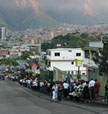 None of Stephen Harper, Stephane Dion, Gilles Duceppe, Jack Layton, or (new Green Party leader Elizabeth May) really seem to spend much time worrying about Canada and its neighbours way down south, where most people speak Spanish instead of English or French. But Prime Minister Harper was in Mexico City for the high-jinks surrounding the official installation of the new Mexican president, Felipe Calderon.
None of Stephen Harper, Stephane Dion, Gilles Duceppe, Jack Layton, or (new Green Party leader Elizabeth May) really seem to spend much time worrying about Canada and its neighbours way down south, where most people speak Spanish instead of English or French. But Prime Minister Harper was in Mexico City for the high-jinks surrounding the official installation of the new Mexican president, Felipe Calderon.
As reported in the Toronto Globe and Mail: “Felipe Calderon vowed to seek reconciliation with his political enemies yesterday after taking the oath of office as Mexico’s President in a fractious meeting of the country’s congress where politicians jeered and stopped just short of a brawl … The 44-year-old conservative politician, who eked out the narrowest of wins in July’s presidential election, was ushered into the congress through a back door and in the matter of a few minutes was sworn into office, with departing president Vicente Fox, his political soulmate, standing beside him … Mr. Fox handed over the tricolor presidential sash to Mr. Calderon in a tumultuous scene that at times bordered on chaos, with foreign dignitaries, including Prime Minister Stephen Harper, former U.S. president George Bush, California Governor Arnold Schwarzenegger and Spain’s Crown Prince Felipe looking on.
 If you set this beside recent reports about the real story of Fidel Castro in Cuba these days, it doesn’t take too much imagination to start wondering if some new era of turmoil in the parts of Hispanic America geographically closest to the USA (and Canada for that matter) is somewhere just around the corner. And Hugo Chavez’s 60%+ victory in the very recent Venezuela election has something of some potential interest to add to this picture as well.
If you set this beside recent reports about the real story of Fidel Castro in Cuba these days, it doesn’t take too much imagination to start wondering if some new era of turmoil in the parts of Hispanic America geographically closest to the USA (and Canada for that matter) is somewhere just around the corner. And Hugo Chavez’s 60%+ victory in the very recent Venezuela election has something of some potential interest to add to this picture as well.
(And it can all make you remember too that if you go to, say, such a once unlikely place as Kansas City these days, you can see signs in Spanish and English on the municipal transit system, just like the French and English signs in various parts of Canada. And then Mexico and Cuba are big Canadian vacation destinations. And you have to start wondering just what Santa Claus and his snowbound sleigh do when they cross the Rio Grande, or leap from Miami to Havana, across the starry midnight winter sky?)
